Ed Gorman's Blog, page 175
December 31, 2011
Great Duane Swierczynski take on Heist novels from Alan Guthrie's NOIR ORIGINALS
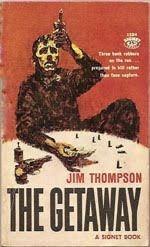
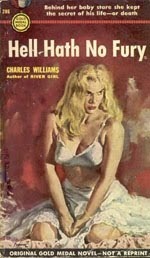
LET'S BOOK 'EM: A SURE-FIRE SURVEY OF BANK ROBBERY NOVELS FROM 'THIS HERE'S A STICK-UP'
by Duane Swierczynski
Consult this survey of sure-fire bank robbery novels and curl up with a good 211.
"Parker is very popular in prison," wrote 1960s-era bank robber Al Nussbaum. "Despite the fact that almost everyone can find some nit to pick with the criminal methods he describes, the strength of the Parker character overshadows any small flaws." Nussbaum was referring to the hardboiled crime series by Richard Stark (a pseudonym of mystery writer Donald Westlake) featuring a professional heister named Parker—no first name, thankyouverymuch. The Parker novels are crisp, cold, suspenseful—and apparently, inspirational. "I've not only read them," wrote Nussbaum, "I've even tried to live a couple of them."
Of course, Nussbaum wasn't your average crime buff—he had a vested interest in the topic. But what might modern-day Nussbaums be reading in the slammer these days?
Blood Money (1927) by Dashiell Hammett. The hero of this short novel—and many other short stories, first published in Black Mask magazine during the 1920s—is a balding, middle aged operative who works for the Continental Detective Agency (think: Pinkerton Agency). In Blood Money—which is actually two related novellas, "The Big Knockover" and "$106,000 Blood Money"—the Continental Op tangles with a criminal mastermind named Popadopalous who organizes an audacious double-bank heist perpetrated by no less than 150 (!) criminals. The $106,000 refers not to the take from the robbery, but rather the bounty on Popadopalous's head. Hammett's seminal hardboiled novel Red Harvest also features a bank robbery as a subplot.
Thieves Like Us (1937) by Edward Anderson. Three escaped convicts resume their careers as bank robbers in Oklahoma, but things become complicated when the youngest bandit, Bowie A. Bowers, falls in love with a cousin of one of the older robbers and decides to make a run at the straight life. Anderson got the idea for the novel after interviewing his cousin Roy Johnson, who was in the Huntsville State Penitentiary for armed robbery; the original title was They're Thieves Like Us. The novel was later filmed as Nicholas Ray's They Live By Night (1949) and Robert Altman's Thieves Like Us (1974), starring Keith Carradine and Shelley Duvall.
Hell Hath No Fury (1953) by Charles Williams. A drifter named Madox wanders into a small town and finds work at a used car lot, but is just biding his time until he can devise the perfect bank robbery by setting diversion fires all over town. But someone's already set a fire for Madox: the used car lot owner's wife. In 1990, Hell was turned into a Dennis Hopper-directed movie called The Hot Spot starring Don Johnson (as Madox), and Virginia Madsen (as the boss's wife, Dolly Harshaw).
The Big Caper (1955) and Steal Big (1960) by Lionel White. White was the king of pulp caper novels—his racetrack robbery thriller, Clean Break, was the basis for Stanley Kubrick's early film noir The Killing. In The Big Caper, White details a complex bank heist, complete with a safecracker, an arsonist, a pair of tough guys, and a phony husband and wife whose job it is to case the bank. But what happens when that couple decides they'd rather live as man and wife for real than pull the bank job? White described another bank heist gone south five years later in Steal Big, where a hardened con named Donovan puts together what he considers the ultimate bank robbing gang—but all of them turn out to be the ultimate collection of sociopathic losers. White has some fun with in-jokes; one Manhattan black market gun dealer operates under the front, "Kubric Novelty Company."
The Getaway (1958) by Jim Thompson. A bank heist perpetrated by a pair of married ex-cons—Doc and Carol McCoy—goes sour, and suddenly a clean getaway is the only thing that matters. Of course, this is a Jim Thompson novel, and in Thompson's sordid little corner of the universe, nothing is clean or easy. Still, Doc McCoy has a few clever heist techniques up his sleeve. Explains one thug named Rudy early in the novel: "First, [Doc] looks for a bank that ain't a member of the Federal Reserve System."
"Oh. Oh, I see," says another criminal. "The Feds don't come in on the case, right, Rudy?"
"Right," says Rudy. "So anyway, he checks that angle, and then he checks on interest rates. If a bank's paying little or nothing on savings, y'see, it means they got a lot more dough than they can loan out. So that tips Doc off on the most likely prospects, and all he has to do then is check their statements of condition—you've seen them printed in the newspapers, haven't you?"
for the rest of this vey groovy (that's right--I said groovy) article go here http://www.allanguthrie.co.uk/pages/n...
HAPPY NEW YEAR EVERYBODY! GOOD HEALTH AND GOOD FORTUNE IN 2012!!!!
Published on December 31, 2011 10:33
December 30, 2011
Start the New Year right...buy BLINDSIDE!
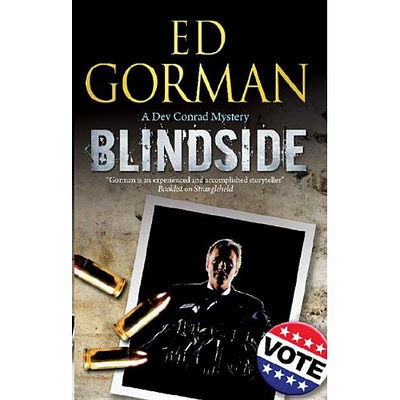
"A fascinating glimpse inside a bruising election campaign replete with ambitious staff (and) odious candidates." Booklist
Kirkus
"In such an amoral world, nothing, it seems, can save the Ward campaign—unless of course Dev discovers that his opponent has fallen victim to the same blackmailer too. Perfect.
Another caustic indictment of electoral politics at its most American. No wonder it's hard to muster much moral outrage when Dev, efficient as ever, identifies the blackmailer and the killer, who act just like everyone else."
Publisher's Weekly:
"Shamus Award–winner Gorman's absorbing third mystery...(analyzes) the good and bad--mostly bad--in current political campaigns...cynical, sharp witted."
Booklist:
"In the third Dev Conrad mystery, veteran Shamus Award winner Gorman does what he does best. His characters are never less than fully realized, his dialogue crackles, and the plot is clever and credible. Using his past experience as a political speechwriter, Gorman provides a fascinating glimpse inside a bruising election campaign replete with ambitious staff, odious candidates, and idealistic volunteers.
Praise for Dev Conrad STRANGLEHOLD
"The most frightening revelations in `Stranglehold' may be the unseemly truths it seems to tell about the status quo of our electoral process."
Severn House
Price: $19.11 from Amazon
Published on December 30, 2011 13:57
December 29, 2011
Forgotten Books: Black Friday by David Goodis
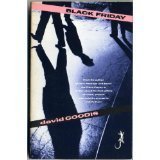
"In fact, the craftsmanship (David Goodis) mastered in all those years of turning out fiction for the pulps was sometimes all that salvaged his books from a morass of aberrant psychology and obsession." --James Sallis
Black Friday is proof absolute of Sallis' comment. It's a crime novel only by default. Here we have the typical Goodis loser loner protagonist, this time named Hart who is on the run from a murder charge. Through a cosmic coincidence he is taken in by a murderous big time burglar named Charley. And his gang.
The story arc deals with a pending huge burglary of fine art and jewelry that Hart will be allowed to join in if he can prove to Charley that he is a "professional"--i.e. a man who never kills for passion but only for money. Loopy at this measure is Goodis makes it go.
But please don't confuse this heist with the book's real import. I remember reading a lot of August Strindberg in my college days as a wanna-be playwright. Goodis has pulled a Strindberg. What a feckless loveless hopeless cast of oddballs and freaks he offers us.
The gang doesn't like Hart so we have scenes of frequent intimidation except for the gangster who starts to like Hart because Hart finds the man's artistic skills impressive (or claims he does), Then there's Freida the obese sad crazed dangerous vamp of Goodisworld. Repellent as he finds her he has to sleep with her because she needs the kind of sex her man Charley can't deliver. He's impotent most of the time. Hart is using her--he literally grimaces when he touches her--but she falls in love with him and Charley figures it out. Charley is not happy.
Then there's Myrna the forlorn faded woman whose brother Paul Hart killed because he seemingly had no choice. She despises Hart at first but eventually they come together. The interplay of all these relationships accounts for seventy-five, maybe eighty per cent of the novel. I couldn't stop flipping the pages though several times I wanted to. This is the only book I've ever read that makes Orwell's Down and Out In Paris and London read like a B'way musical. It's past grim. It's a violent ward of wanton treachery and despair.
It's as close to Grand Guignol as crime fiction gets.
Published on December 29, 2011 13:38
December 28, 2011
CHARLES BECKMAN, HONKY-TONK GIRL, AND I by Gary Lovisi
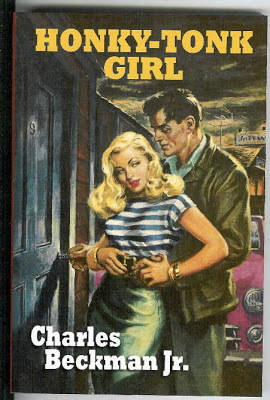
CHARLES BECKMAN, HONKY-TONK GIRL, AND I
by Gary Lovisi
One of the great things about publishing Paperback Parade, my magazine about collectable paperbacks and paperback publishing is all the wonderful articles and interviews it contains with so many artists and authors. My writers and I do a lot of research to find vintage era artists and authors, but sometimes they find me. Like when I received an email from Patti Boeckman, the wife of legendry pulp writer and jazz musician Charles Boeckman, Jr., who wrote under the name Charles Beckman, Jr.
When Patti asked me in her email if I knew who her husband was, I just blushed with joy and told her -- do I! Of course I recognized his name! In fact, I had many of his stories and books in my collection. From then on I had many back and forth emails with Charles, now 92. I eventually interveiwed him for Paperback Parade #77 and we became fast friends. He's a fine geltleman, a master jazz muscian for over 6 decades and a vintage era pulpster who has been writing for over half a century. The issue also featured rare excerpts from letters to him from his pulp editors of the 1940s, all about him and his work that open a fascinating window into the pulp writing business of that era. Charles wrote westerns for the 1940s pulps, crime stories for the 1950s digest mags and one early novel from 1953, Honky-Tonk Girl, which I feel is a minor hard crime and noir masterpiece, a classic crime novel.
Honky-Tonk Girl tells the tough story of Jazz musician Johnny Nickles and the members of his band adrift in a crooked town where every hand is played against him and his band. Beckman gives us great characters all awash in his authentic jazz background -- he is after all a longtime jazzman and knows all the riffs -- then he mixes in murder, mystery, and not one, but 3 femme fatales! It's a furiously churning noir soup. A very cool and fun novel to read. After I read it I immediately knew this was a book that was ripe for reprinting and deserved a new edition so it could be enjoyed by today's noir and crime fan audience.
Now, through the graces of Robert Reginald at Borgo Press / Wildside Books, $18.00 www.wildsidebooks.com) Honky-Tonk Girl has been reprinted in a new and attractive trade paperback. This is the first and only edition in over 60 years! This new Borgo Press edition features my introduction and the classic bad-gal sexy cover art from the original rare Falcon Books digest paperback edition. That original digest is rare today and sells for a hundred bucks or more, but this new Borgo edition really hits the mark and brings back to life a very underrated crime noir novel at a very affordable price.
Anyone interested in Honky-Tonk Girl can order a copy through Wildside Press. If you are interested in vintage and collectable paperbacks, I know you will get a kick out of my magazine Paperback Parade; a 4-issue subscription is just $35 in the US. You can find out more at my website www.gryphonbooks.com.
END[image error]
Published on December 28, 2011 08:40
December 27, 2011
Very Cool Books From The Pulps; Black Dog Books
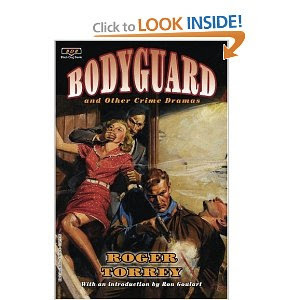
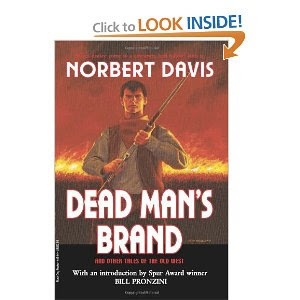
Yes there actually were pulp writers other than Hammett, Chandler Gardner worth reading and studying. Tom Roberts Roberts at Black Dogs Books has heroically set about demonstrating that with his line of sturdy, attractive trade paperbacks that highlight some of the lesser known scribes who filled the pages of pulps major and minor.
BODYGUARD AND OTHER STORIES
Roger Torrey isn't somebody I knew much about. I'd read a few of his stories but hadn't been impressed enough to hunt more down. My loss. In this collection of hardboiled crime stories we find a storyteller whose tales go down as smoothly as a chocolate malt. He knew how to keep excitement at a high pitch but what keeps his tales memorable is a mordancy you don't find in a lot of routine pulp crime. There's a grittiness and sense of doom in these pieces that make you realize you're reading about real human beings instead of the usual stereotypes (though you'll find those here too).
The biographical piece by Ron Goulart is excellent and gives amply motive for the mordancy I mentioned. Torrey died whenhe was not quite forty. He never met a bottle he didn't like.
DEAD MAN'S BRAND AND OTHER STORIES
As readers of this blog know, Norbert Davis is my favorite pulp writer. Not only was he masterful at plot and pace his sly and wry take on humanity oddly enough gave his stories a reality his more melodramatic peers rarely equaled. As a fan of forty years, I've read as much of his crime fiction as I could find. I learned through various biographical studies that Davis had also written for western pulps but except for a few odd samples here and there I'd never read any.
Once again Tom Roberts and Black Dog Books have rescued a major writer's lesser known work and published it in an attractive durable edition complete with one of Bill Pronzini's unequaled portraits of a pulp writer.
What sets Davis' western fiction apart from standard fair is once again his take on humanity. I recall reading a long time ago a criticism of his work that claimed his stories suffered because of his "odd" characters. But that's what makes the stories work. All the familiar tropes of the western are here--though I think Davis brought not only action but a real western color to his stories; he'd done his homework--but also some of his usual insights into people who are just a wee bit different from standard pulp types.
As with the Torrey, I had a great time reading this collection and I want to tip my hat to Tim Roberts and all the fine salvage work Black Dog Books is doing.
Published on December 27, 2011 13:49
December 26, 2011
Dennis Hopper vs. Don Johnson
Here's a movie note from Wikipedia about The Hot Spot as directed by Dennis Hopper. Imagine Mitchum in the lead. Wow. Don Johnson never did much for me though I thought he did a good job here.
"Charles Williams wrote a screenplay version of his own novel with Nona Tyson in 1962.[1] It was intended for Robert Mitchum. Many years later, Dennis Hopper found the script and updated it.[1] The director described the film as "Last Tango in Texas. Real hot, steamy stuff".[2] A bedroom scene originally called for Madsen to appear naked, but she decided to put on a negligee because she felt that, "Not only was the nudity weak storywise, but it didn't let the audience undress her".[3] Hopper later admitted that Madsen was right.[3] The director gave his impressions of working with Johnson: "He wasn't that bad. He has a lot of people with him. He came on to this film with two bodyguards, a cook, a trainer, ah let's see, a helicopter pilot he comes to and from the set in a helicopter, very glamorous let's see, two drivers, a secretary, and, oh yes, his own hair person, his own make-up person, his own wardrobe person. So when he walks to the set he has five people with him".[4] Johnson found Hopper's approach to filmmaking "a little disappointing, I gotta tell you".[5] Hopper shot the film in Texas during what he described as the "hottest, steamiest weather you could imagine".[6]"
"Charles Williams wrote a screenplay version of his own novel with Nona Tyson in 1962.[1] It was intended for Robert Mitchum. Many years later, Dennis Hopper found the script and updated it.[1] The director described the film as "Last Tango in Texas. Real hot, steamy stuff".[2] A bedroom scene originally called for Madsen to appear naked, but she decided to put on a negligee because she felt that, "Not only was the nudity weak storywise, but it didn't let the audience undress her".[3] Hopper later admitted that Madsen was right.[3] The director gave his impressions of working with Johnson: "He wasn't that bad. He has a lot of people with him. He came on to this film with two bodyguards, a cook, a trainer, ah let's see, a helicopter pilot he comes to and from the set in a helicopter, very glamorous let's see, two drivers, a secretary, and, oh yes, his own hair person, his own make-up person, his own wardrobe person. So when he walks to the set he has five people with him".[4] Johnson found Hopper's approach to filmmaking "a little disappointing, I gotta tell you".[5] Hopper shot the film in Texas during what he described as the "hottest, steamiest weather you could imagine".[6]"
Published on December 26, 2011 10:39
December 25, 2011
Eastwood-Tarantino-Towne: Sarris: Boetticher
Thanks to a tip from my cousin I ordered the Netflix version of the Budd Boetticher-Randolph Scott film The Tall T which has, as one of its features, the documentary about Budd Boetticher's life and career. With commentary by the likes of Clint Eastwood, Quentin Tarantino, Paul Schrader, Peter Bogdonovich, Taylor Hackford and and Andrew Sarris. A fascinating life and a fascinating career. The surprise for me was Clint Eastwood--smart, affable, wry and eager to tell some really good Hwood stories, especially about the evolution of Two Mules for Sister Sara. I want to start seeing some of his movies again. I was a big fan for a long time. Anyway if you're a film fan this is an important look at Hwood.[image error]
Published on December 25, 2011 19:27
December 24, 2011
John Fante
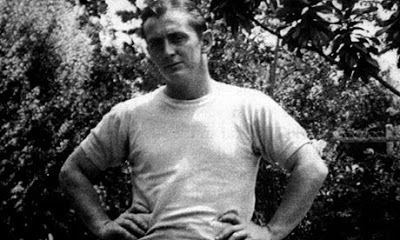
Ed here: I reread Ask The Dust this week and it had its usual narcotic effect on me. Strange that in the next novel I read, David Goodis' Black Friday, I saw in the story and heard in the language some of the darkest moments of Fante's novel. If you haven't read it--or read the Goodis for that matter--do so.
Happy Holidays everybody!
Discovering John Fante FROM THE GUARDIAN UK From 2010
As in life, he seems forever on the brink of eclipse, so finding his work comes as a revelation to successive generations of readers. How did you find him?
I came upon John Fante's Ask the Dust by the window on the first floor of Waterstone's Piccadilly. It wasn't a very cool way to discover him – he was there as part of a half-table promotion on cult writers and renegades, alongside James Joyce, Richard Brautigan, William Burroughs and Irvine Welsh – but it still felt like an epiphany.
"Los Angeles, give me some of you!" pleads aspiring writer Arturo Bandini in the opening chapter. "Los Angeles come to me the way I came to you, my feet over your streets, you pretty town I loved you so much, you sad flower in the sand, you pretty town …"
As I read I forgot to breathe. Fante's sentences ran into a dark wilderness; a winded substratum of 30s LA. I felt dared and defiled and improved; like I'd joined a secret club consisting of everyone in the universe who wants to write:
"Only two words written over and over across the page, up and down, the same words: palm tree, palm tree, palm tree, a battle to the death between the palm tree and me, and the palm tree won: see it out there swaying in the blue air, creaking sweetly in the blue air."
The frankness, the spare and open description, was shaming and expansive all at once. I couldn't believe no one had ever told me that Holden Caulfield, that neurotic miracle, had this wild older brother:
"They say it's a dollar, they say it's two dollars in the swell places, but down on the Plaza it's a dollar; swell, only you haven't got a dollar, and another thing, you coward, even if you had a dollar you wouldn't go, because you had a chance to go once in Denver and you didn't."
Today, at 11am the Los Angeles Visionaries Association invites you to the corner of 5th & Grand, next to the library in downtown LA. This is the library where Charles Bukowski took Ask the Dust back to his desk "like a man who had found gold in the city dump". He spent years attempting to rescue Fante, whom he called "a God" of energy and form, but Fante remained an outsider, buried under Raymond Chandler, then Hollywood, then Depression-era reading lists partial to Steinbeck and Harper Lee. Now, though, on the 101st anniversary of his birth, the city is renaming that intersection John Fante Square.
Like his Square, Fante-the-author is generally happened upon; never really finding his own audience but always surviving another curve. His writing, though, is so clean and clear that it speaks plainly and entirely for itself. "The book," writes Bukowski, "is yours".
So let's get this 101st birthday party started. How did you discover John Fante?
Published on December 24, 2011 14:51
December 23, 2011
Amazon Deal of the Day!
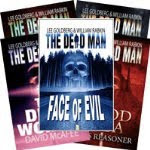
Amazon Deal of the Day!
Amazon.com: The Kindle Daily Deal: Kindle Daily Deal: "The Dead Man" Books 1-5
Today only, the first five books in Lee Goldberg and William Rabkin's "Dead Man" series--original short novels that blend the horror of Stephen King with the action of classic adventure novels--are just $0.99 each (67% off yesterday's price).
Yesterday's Price: $2.99
Today's Discount: $2.00
Kindle Daily Deal Price: $0.99 (67% off)
Published on December 23, 2011 14:20
HALO FOR HIRE: THE COMPLETE PAUL PINE by Howard Browne
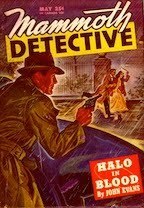
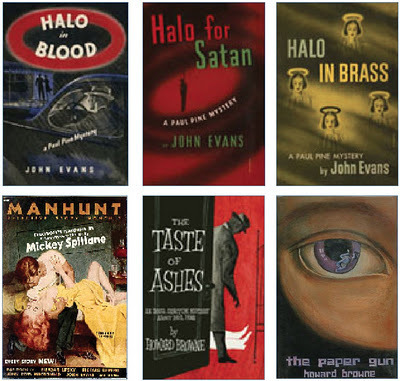
HALO FOR HIRE: THE COMPLETE PAUL PINE by Howard Browne
Not much to add on this title at the moment, except to say that work progress and we thought we'd give you a look back at some of the covers to the original presentation of the "Paul Pine" stories by Howard Browne (aka John Evans):
• HALO IN BLOOD
• HALO FOR SATAN
• HALO IN BRASS
• "So Dark for April" from MANHUNT
• THE TASTE OF ASHES
• "The Paper Gun"
Published on December 23, 2011 08:32
Ed Gorman's Blog
- Ed Gorman's profile
- 118 followers
Ed Gorman isn't a Goodreads Author
(yet),
but they
do have a blog,
so here are some recent posts imported from
their feed.



